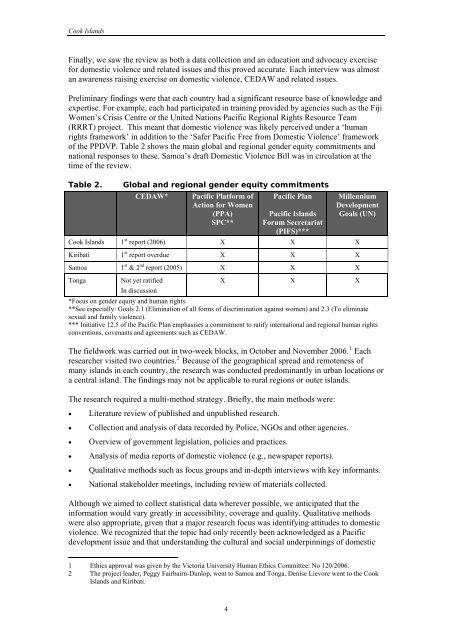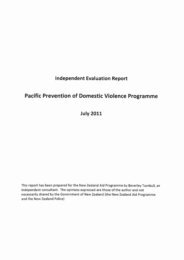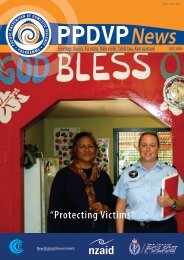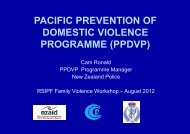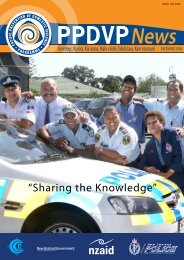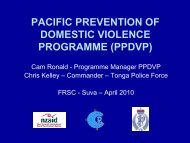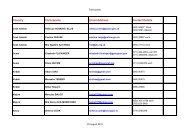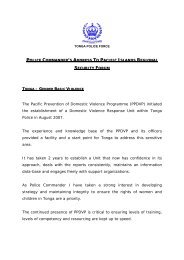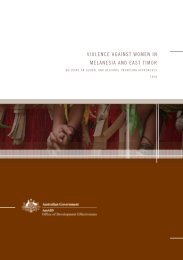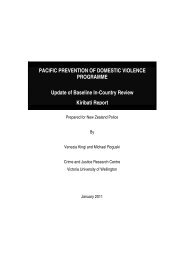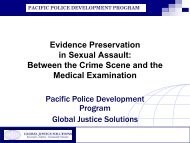Cook Islands - Pacific Prevention of Domestic Violence Programme
Cook Islands - Pacific Prevention of Domestic Violence Programme
Cook Islands - Pacific Prevention of Domestic Violence Programme
Create successful ePaper yourself
Turn your PDF publications into a flip-book with our unique Google optimized e-Paper software.
<strong>Cook</strong> <strong>Islands</strong><br />
Finally, we saw the review as both a data collection and an education and advocacy exercise<br />
for domestic violence and related issues and this proved accurate. Each interview was almost<br />
an awareness raising exercise on domestic violence, CEDAW and related issues.<br />
Preliminary findings were that each country had a significant resource base <strong>of</strong> knowledge and<br />
expertise. For example, each had participated in training provided by agencies such as the Fiji<br />
Women’s Crisis Centre or the United Nations <strong>Pacific</strong> Regional Rights Resource Team<br />
(RRRT) project. This meant that domestic violence was likely perceived under a ‘human<br />
rights framework’ in addition to the ‘Safer <strong>Pacific</strong> Free from <strong>Domestic</strong> <strong>Violence</strong>’ framework<br />
<strong>of</strong> the PPDVP. Table 2 shows the main global and regional gender equity commitments and<br />
national responses to these. Samoa’s draft <strong>Domestic</strong> <strong>Violence</strong> Bill was in circulation at the<br />
time <strong>of</strong> the review.<br />
Table 2.<br />
Global and regional gender equity commitments<br />
CEDAW* <strong>Pacific</strong> Platform <strong>of</strong><br />
Action for Women<br />
(PPA)<br />
SPC**<br />
<strong>Pacific</strong> Plan<br />
<strong>Pacific</strong> <strong>Islands</strong><br />
Forum Secretariat<br />
(PIFS)***<br />
Millennium<br />
Development<br />
Goals (UN)<br />
<strong>Cook</strong> <strong>Islands</strong> 1 st report (2006) X X X<br />
Kiribati 1 st report overdue X X X<br />
Samoa 1 st & 2 nd report (2005) X X X<br />
Tonga<br />
Not yet ratified<br />
X X X<br />
In discussion<br />
*Focus on gender equity and human rights.<br />
**See especially: Goals 2.1 (Elimination <strong>of</strong> all forms <strong>of</strong> discrimination against women) and 2.3 (To eliminate<br />
sexual and family violence).<br />
*** Initiative 12.5 <strong>of</strong> the <strong>Pacific</strong> Plan emphasises a commitment to ratify international and regional human rights<br />
conventions, covenants and agreements such as CEDAW.<br />
The fieldwork was carried out in two-week blocks, in October and November 2006. 1 Each<br />
researcher visited two countries. 2 Because <strong>of</strong> the geographical spread and remoteness <strong>of</strong><br />
many islands in each country, the research was conducted predominantly in urban locations or<br />
a central island. The findings may not be applicable to rural regions or outer islands.<br />
The research required a multi-method strategy. Briefly, the main methods were:<br />
• Literature review <strong>of</strong> published and unpublished research.<br />
• Collection and analysis <strong>of</strong> data recorded by Police, NGOs and other agencies.<br />
• Overview <strong>of</strong> government legislation, policies and practices.<br />
• Analysis <strong>of</strong> media reports <strong>of</strong> domestic violence (e.g., newspaper reports).<br />
• Qualitative methods such as focus groups and in-depth interviews with key informants.<br />
• National stakeholder meetings, including review <strong>of</strong> materials collected.<br />
Although we aimed to collect statistical data wherever possible, we anticipated that the<br />
information would vary greatly in accessibility, coverage and quality. Qualitative methods<br />
were also appropriate, given that a major research focus was identifying attitudes to domestic<br />
violence. We recognized that the topic had only recently been acknowledged as a <strong>Pacific</strong><br />
development issue and that understanding the cultural and social underpinnings <strong>of</strong> domestic<br />
1 Ethics approval was given by the Victoria University Human Ethics Committee: No 120/2006.<br />
2 The project leader, Peggy Fairbairn-Dunlop, went to Samoa and Tonga. Denise Lievore went to the <strong>Cook</strong><br />
<strong>Islands</strong> and Kiribati.<br />
4


